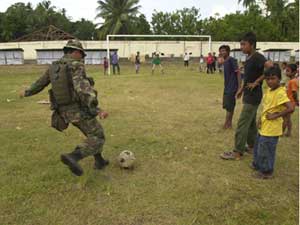
It's been two weeks since I enlisted, and I'm back for the weekend. Time passes quickly inside, the routine keeps one going, at least some form of predictability in life. Training is tough, but manageable still. I think they'll up the tempo and severity now, since the adjustment period is over, and they get free rein to do anything they wish now. I want to get a book before I go in, but have no idea what to get. There usually is enough free time for one to read, during the night when I have no calls to make. All those in my detachment seem to be attached, leaving me to quietly while away my time between 2130 and 2200. I don't see it as a curse, some quiet reflection time is usually good, and getting ready for the next day usually fills this period which I have at night. But I guess it's just envy on my part, seeing all the other guys having someone they can talk to, and have someone listen to them.
Just managed to pick up bits of pieces of news while I'm out. Taupok, Meulaboh, Presidential Inaugaration, all these things have happened as I stayed in the time capsule that is my base. The world speeds by while I do crunches and pull ups (or attempt to). Subscribed to Time magazine, hope that can keep me up to date from week to week. The SAF really is doing a good job in Aceh, seeing from the picture above how they mix with the locals. The peacetime SAF really is showing itself to be worthy of 6% of Singapore's GDP. I wonder if I'll get my chance to do some work like that as well. As a recruit, I guess my job now is just to get my basics right, learn as much as possible, and prepare to deploy when I'm ready.
Watched Hotel Rwanda on Friday, can't say it was really that moving, I guess because I read up on all the statistics and the news coverage, and the fact that the film was sanitised, made it less impactful. The scouts I watched with seemed surprised, like they never heard of the incident. Maybe when we were in primary school, such things never stuck in our minds. I faintly recall the "Rwandan Massacre" when I was in Primary 2 or 3, and if not for my history lessons on the failure of the UN, I probably would be as ignorant as others. Like the reporter said in the show, "People are going to watch this genocide on their TVs over dinner, they're going to say 'Oh my god, those poor people'. Then they're going to continue eating their dinner."
It really seems so true, that the colour of our skin really matters. The only reason why the Western world even bothers with aiding in the tsunami is because white people in Phuket and Sri Lanka were involved. I don't recall the same amount of effort being spared to help those in the Iran Bam earthquake last year, or the Sudan crisis. I don't know how long it will take to realise that despite the colour of our skin, or the choice of our faiths, we are all still human. Maybe the next Ice Age.
I guess I'll have to try my best, sort the world out one person at a time. That's how miracles start, one small step at a time, and with determination to carry the task through, staying on the ball and sticking with it all the way, we'll make it. Like my former RJ principal once said, "The impossible we do now. Miracles, take a little longer."
Don
